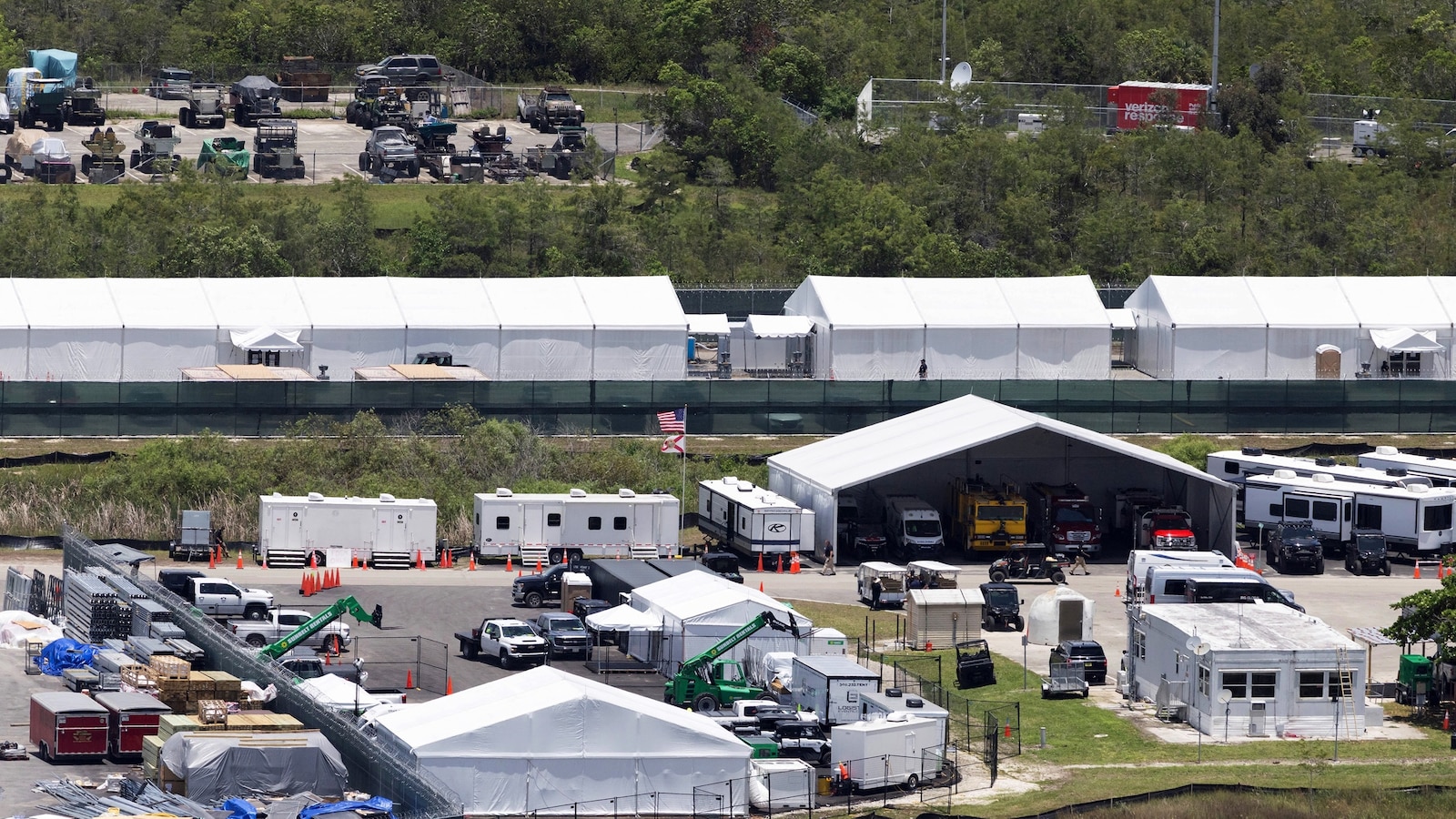Judge temporarily blocks further construction of ‘Alligator Alcatraz’ detention center

A federal judge on Thursday temporarily halted any further construction of the immigrant detention center known as “Alligator Alcatraz.”
U.S. District Judge Kathleen Mary Williams granted a temporary restraining order after two days of testimony about the environmental impact of the site.
The state of Florida and President Donald Trump’s administration can continue to use the facility and house detainees there, but any further construction must be halted for 14 days.
An aerial view shows “Alligator Alcatraz” ICE detention center at Dade-Collier Training and Transition Airport in Ochopee, Florida, July 24, 2025.
Marco Bello/Reuters
While the hearing was set to resume on Tuesday, Judge Williams granted the temporary order to prevent possible harm to the sensitive Everglades ecosystem in the meantime.
Environmental groups and the Miccosukee Tribe of Indians of Florida urged Judge Williams to block the construction site because the detention center was completed without conducting necessary impact studies. The area is home to multiple sensitive species — including the endangered Florida Panther — and is considered sacred to the Miccosukee tribe.
“We welcome the court’s decision to pause construction on this deeply concerning project. The detention facility threatens land that is not only environmentally sensitive but sacred to our people. While this order is temporary, it is an important step in asserting our rights and protecting our homeland. The Miccosukee Tribe will continue to stand for our culture, our sovereignty, and the Everglades,” Miccosukee Chairman Talbert Cypress said in a statement.
A spokesperson for Florida AG James Uthmeier’s office released a statement to ABC News in response to the judge’s ruling.
“Judge Williams’ order is wrong, and we will fight it. However, it does not shut down Alligator Alcatraz, which will continue to send illegal aliens back to where they came from,” the statement read.
The judge’s decision on Thursday comes after Wednesday’s hearing only saw five witnesses called to the stand by the environmental groups that filed the lawsuit, instead of the multiple state and federal officials who were set to testify.
At issue is the question of whether federal and state officials bypassed legally required environmental impact studies during construction of the facility — which plaintiffs say should block it from being used as a detention center.
Attorneys representing Florida officials have argued that the facility was initially funded by, constructed and managed by the state and is therefore exempt from the National Environmental Policy Act — the main law being used to challenge the facility’s compliance.
Alligator Alcatraz has so far operated in what immigration advocates have described as a jurisdictional gray zone — with the facility funded by the federal government but run by the state of Florida — that they allege allows officials to skirt some legal requirements.
Florida Gov. Ron DeSantis has previously argued that the state of Florida is “implementing” the federal government’s immigration policy with the expectation that the state would be fully reimbursed for the costs of Alligator Alcatraz, but local and federal officials have so far been unable to tell the federal courts who is actually in charge of the facility.
The hearing — at which federal, state, and tribal officials are testifying — comes amid heightened scrutiny of the facility, which was once touted as a “one-stop shop to carry out President Trump’s mass deportation agenda.”
Located 50 miles west of Miami in the heart of the Florida Everglades, Alligator Alcatraz was quickly constructed over a matter of weeks, utilizing hundreds of tents, trailers, and other temporary facilities to potentially house more than 3,000 detainees.
The facility was built on the grounds of the Dade-Collier Training and Transition Airport, a sparsely used piece of tarmac owned by Miami-Dade County.
Alligator Alcatraz also neighbors land leased to the Miccosukee Indian Tribe, including villages, a school, traditional hunting areas, and sacred sites. The Miccosukee Tribe joined the lawsuit last month, arguing that the facility threatens to damage nearby tribal villages.
This is a developing story. Please check back for updates.

